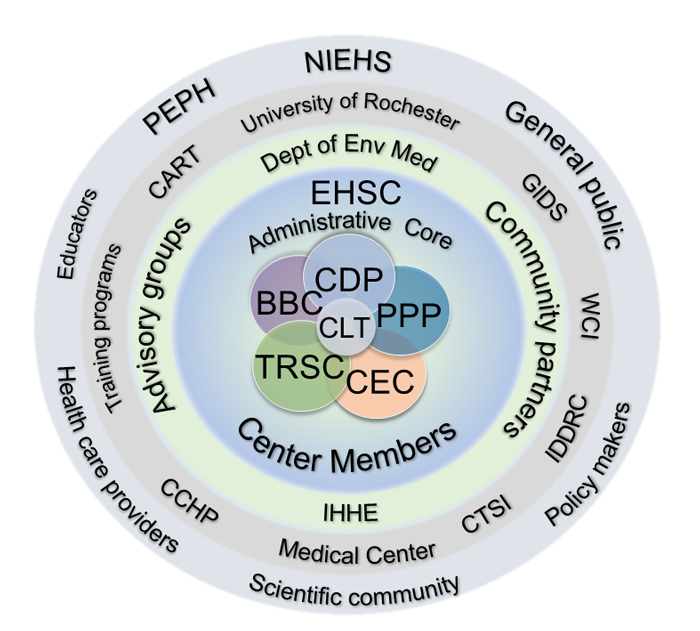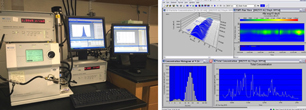Welcome to the Rochester Environmental Health Sciences Center!
 Established in 1975, we are a Center of Excellence supported by the National Institute of Environmental Health Sciences (NIEHS). Our central mission is to prevent and alleviate diseases caused or exacerbated by environmental factors by promoting translational research and partnerships. This mission is guided by the fact that environmental factors are key drivers of many diseases, and that many environmental factors are modifiable. By supporting research and partnerships, we help to improve human health by accelerating the discovery of how environmental factors impact health throughout life and increase the pace at which discoveries are converted into strategies to reduce or prevent disease.
Established in 1975, we are a Center of Excellence supported by the National Institute of Environmental Health Sciences (NIEHS). Our central mission is to prevent and alleviate diseases caused or exacerbated by environmental factors by promoting translational research and partnerships. This mission is guided by the fact that environmental factors are key drivers of many diseases, and that many environmental factors are modifiable. By supporting research and partnerships, we help to improve human health by accelerating the discovery of how environmental factors impact health throughout life and increase the pace at which discoveries are converted into strategies to reduce or prevent disease.
The EHSC provides a crucial framework for the generation of novel research discoveries and their conversion into effective resources for scientists, public health officials, health care professionals, and the community. By visiting our website you will learn more about center research, community engagement, cores and facilities, and our collaborative members.
 Our Center is administratively housed in the Department of Environmental Medicine, and draws on resources and expertise of the University of Rochester, including the UR Medical Center. The Department also supports and integrates many other activities that benefit the center, including Graduate Programs in Toxicology, Epidemiology, and many other biomedical areas, the Biostatistics in Environmental Health Training Program, Lake Ontario Microplastics Center, and the Life Sciences Learning Center.
Our Center is administratively housed in the Department of Environmental Medicine, and draws on resources and expertise of the University of Rochester, including the UR Medical Center. The Department also supports and integrates many other activities that benefit the center, including Graduate Programs in Toxicology, Epidemiology, and many other biomedical areas, the Biostatistics in Environmental Health Training Program, Lake Ontario Microplastics Center, and the Life Sciences Learning Center.
Best regards,
Paige

B. Paige Lawrence, PhD
Center Director
Wright Family Research Professor
Chair, Department of Environmental Medicine
Director, Institute for Human Health and the Environment

Team Science Showcase: The People and Partnerships Moving Microplastics Research Forward
Public concern about microplastics and human health is growing. Learn how University of Rochester scientists and community partners are advancing research through interdisciplinary teams and innovative collaborations.
Read the full story →
People
The EHSC is composed of researchers from departments across the University of Rochester.

Cores and Facilities
Center activities are supported by integrated cores and facilities.

Community Engagement
The CEC is a source of environmental health information for the entire community.
Support the Toxicology Student Professional Development Fund
Visit the Institute for Human Health and the Environment
This website is supported in part by a grant from the National Institute of Environmental Health Sciences (P30 ES001247).
Upcoming Seminar
EnLight Seminar Series: "Almost Human: Ethical Challenges for Reporting Back Environmental Health Research"
Jonathan Herington, PhD
Assistant Professor, Department of Health Humanities and Bioethics and Department of Philosophy, University of Rochester
Thu, Feb 19 @ 11:00 AM
SMD | EHSC Conference Room (4.8820)For Zoom link contact Anisah Mercado
Latest News
February 9, 2026
Team Science Showcase: The People and Partnerships Moving Microplastics Research Forward
February 5, 2026
The Society of Toxicology Recognizes Professors with Awards
January 7, 2026
Researchers raise concerns about faster aging, possible early-onset dementia, for children and young adult cancer survivors











